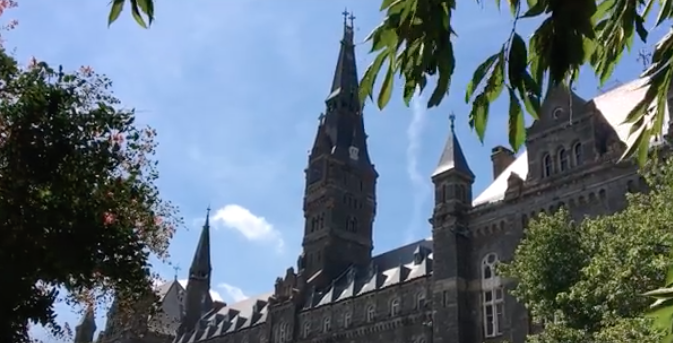Georgetown University suspends legal scholar over Supreme Court tweet

Georgetown University placed a newly-hired law professor on leave after one of his social media posts led to an outcry from leftists on social media and on its college campus. Ilya Shapiro, a former legal scholar at the libertarian think tank Cato Institute, was supposed to start working as a senior lecturer at the Jesuit-run Catholic private university before being placed on leave.
Shapiro got in hot water over a tweet about potential Supreme Court nominees for President Joe Biden. He was pointing out, in his opinion, how playing the race and gender card in the Supreme Court nomination process is a disservice to qualifications of judges who do not meet those standards. In his mind, D.C. Circuit Court Judge Sri Srinivasan, would be a more qualified nominee than some names floated around in the news cycle. He said that because Srinivasan’s male gender “doesn’t fit the hierarchy so we’ll get a lesser black woman” and that any of the potential black female nominees would “have an asterisk attached” to their names because of the race and gender standard set forth by Biden.
He apologized for the “inartful” tweet, which “undermined my message that nobody should be discriminated against for his or her skin color.” Shapiro said that “blatantly using identity policies… is discrediting to a vital institution.” He concluded, “Reasonable people can disagree on that particular assessment, but it’s a shame that he and other men and women of every race are excluded from the outset of the selection process” for the Supreme Court.
Georgetown Law Dean William Treanor, in a statement, said, “Over the past several days, I have heard the pain and outrage of so many at Georgetown Law, and particularly from our Black female students, staff, alumni, and faculty. Ilya Shapiro’s tweets are antithetical to the work that we do here every day to build inclusion, belonging, and respect for diversity.”
A group representing Shapiro, the Foundation for Individual Rights in Education (FIRE), said that the dean “made the wrong decision in authorizing this witch hunt, and every day that it continues is an affront to free speech and fairness at Georgetown.” FIRE added, “Georgetown’s embarrassing capitulation is antithetical to the tenets of liberal education.”
Shapiro, in the minds of libertarians and conservatives, is not the only professor or academic to come under fire for controversial social media posts. But to the political Right, it seems as though they are more frequently singled out for criticism and shame than controversial posts from leftist professors. Free speech, at least according the Constitution, should be handled equally across the board.
Yet Shapiro’s since-deleted tweet makes sense in context of affirmative action narratives. In pre-woke work environments, job applicants or nominees for judicial positions, such as on the Supreme Court, used to be interviewed and selected based on qualifications and achievements, not solely on race or gender. If anything, race and gender should be a part of the overall profile of any given nominee, but it should not be the sole factor in a nominee’s selection. After all, which person would want to be solely judged on their race and gender for any work position or role in life?
A famous civil rights leader, Martin Luther King, Jr., once declared, “I have a dream that my four little children will one day live in a nation where they will not be judged by the color of their skin but by the content of their character.”
Biden’s selection standards appear to go against the standard that King Jr. set out for Americans, which Shapiro may have tried to present to his audience on social media.




